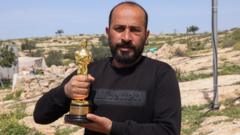On Wednesday, the Academy released an initial statement regarding the incident but notably did not mention Mr. Ballal or his film directly. This omission sparked outrage among prominent figures, including Mark Ruffalo, Olivia Colman, and Javier Bardem, who collectively penned a scathing letter condemning the Academy's silence. They argued that it was "indefensible" for the institution to celebrate Mr. Ballal's achievements only to neglect his plight shortly afterward.
The letter emphasized the immense challenges filmmakers face in earning an Oscar, illustrating the difficult road to recognition that Mr. Ballal and his team navigated without the financial backing typically associated with such awards. The filmmakers' right to express their narratives was framed as a broader issue of free speech, which the Academy’s initial statement seemingly disregarded.
In light of the backlash, the Academy issued a revised statement on Friday, explicitly naming Mr. Ballal. They expressed regret for not acknowledging him directly and made it clear that violence against artists is unacceptable. "We sincerely apologize to Mr. Ballal and all artists who felt unsupported by our previous statement," the Academy conveyed, emphasizing their stance against the suppression of free speech.
Mr. Ballal's release followed a troubling sequence of events where he claimed he was attacked by settlers before being apprehended by Israeli military forces. The IDF has disputed these claims, stating that arrests were made in connection with alleged "rock hurling" incidents involving Palestinians and an Israeli citizen.
The documentary "No Other Land," which won the best documentary award at the 97th Academy Awards, highlights the ongoing struggle over Masafer Yatta—a community of villages—while also showcasing a bond between its directors, Adra and Abraham. This incident thus sheds light not only on the challenges faced by Palestinian filmmakers but also on the cultural and political implications surrounding the narratives told within the awards circuits.
The letter emphasized the immense challenges filmmakers face in earning an Oscar, illustrating the difficult road to recognition that Mr. Ballal and his team navigated without the financial backing typically associated with such awards. The filmmakers' right to express their narratives was framed as a broader issue of free speech, which the Academy’s initial statement seemingly disregarded.
In light of the backlash, the Academy issued a revised statement on Friday, explicitly naming Mr. Ballal. They expressed regret for not acknowledging him directly and made it clear that violence against artists is unacceptable. "We sincerely apologize to Mr. Ballal and all artists who felt unsupported by our previous statement," the Academy conveyed, emphasizing their stance against the suppression of free speech.
Mr. Ballal's release followed a troubling sequence of events where he claimed he was attacked by settlers before being apprehended by Israeli military forces. The IDF has disputed these claims, stating that arrests were made in connection with alleged "rock hurling" incidents involving Palestinians and an Israeli citizen.
The documentary "No Other Land," which won the best documentary award at the 97th Academy Awards, highlights the ongoing struggle over Masafer Yatta—a community of villages—while also showcasing a bond between its directors, Adra and Abraham. This incident thus sheds light not only on the challenges faced by Palestinian filmmakers but also on the cultural and political implications surrounding the narratives told within the awards circuits.


















